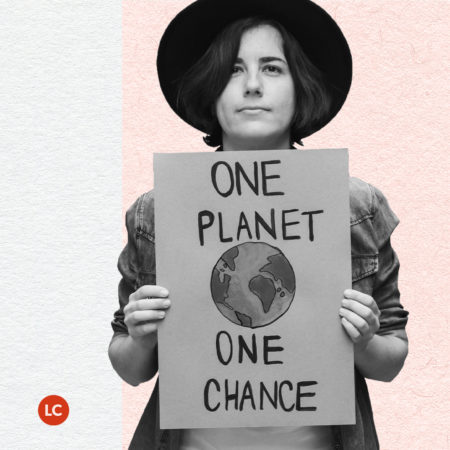According to the latest IPCC report, the cost of doing nothing and continuing business as usual is only accelerating and advancing future risks. We are on track to see global warming more than double the internationally agreed-upon limit by the end of the century. If this happens, 3 billion people will experience chronic water insecurity and many of the staple crops that feed us will be threatened—leading to rising hunger worldwide. We can also expect an increase in natural disasters, the entire resettlement of coastal cities due to rising sea levels, and the extinction of more than 25,000 species. This isn’t speculation. It’s a fact.
Aside from altering our daily routines and committing to buy sustainable brands, what else can we realistically do to reverse the tide of the climate crisis?
Aside from being conscious consumers, we can demand action through how we choose to invest our money. Our investments have an impact, and we have the power to determine whether that impact is positive or negative.

E for environmental, S for social impact and equality, and G for Governance. We must prioritize the E, the S, and the G in ESG. Photo credit: Studio Kenzo
The intersection of environmental, social, and governance (ESG) investing and impact investing provides us with an opportunity to invest in our future—while generating both social and financial returns. It’s a chance to prioritize people and the planet, invest in and/or buy from companies with more diverse leaders and decision-makers, and create a global economy that lives within its environmental means, reduces inequalities, and steers money and power away from countries and companies that violate human rights. Simply put: It’s a way forward that will help us prevent a climate catastrophe.
As consumers and investors, we are among the most important stakeholders for businesses. They rely on our capital to finance their operations, which gives us immense influence to transform our world. This is exactly why ESG and impact investing are powerful tools in the fight to save our planet. By reallocating capital toward businesses with high standards—and away from those investing in the fossil fuels that are exacerbating climate change—it will become increasingly difficult for companies to make a profit without prioritizing people and the planet.
The global economy relies on a sustainable natural world to make a profit—and this affects everyone. According to the World Bank, the loss of biodiversity and ecosystem services due to climate change could cost the global economy $2.7 trillion by 2030. If we continue on this current path, the massive disruptions coming our way will force businesses to rethink their role as global stewards of multiple stakeholders. Those that fail to do so simply will not survive. Allow me to explain.
Rising sea levels threaten real estate and coastal infrastructure. Increasing water scarcity around the world will disrupt supply chains and business operations. New regulations on fossil fuels, climate risk, and impact disclosure requirements will require businesses to prioritize sustainability as much as financial performance. And companies’ reputations will suffer as investors and consumers increasingly favor more sustainable companies. According to 5WPR’s 2020 Consumer Culture Report, 83% of millennials say it’s important for companies they buy from to align with their values.

Financial performance will depend on sustainability performance. There is no planet B. Photo credit: Studio Kenzo
Today, investors representing trillions of dollars are beginning to realize this. They are passionate about exchanging dollars for a difference. One poll by Domini Impact Investments shows that more than 50% of respondents would be willing to sacrifice performance on their investments to achieve their ESG goals. While this is noble—and very telling about the value consumers place on sustainable investing—it may not be necessary.
Case in point: More than 80% of ESG funds outperformed their benchmarks in 2020. That’s because today’s most progressive and visionary business leaders are already ahead of the curve. They understand that investments in clean energy, low-carbon and climate-resilient water infrastructure, and higher-quality health services for all are an investment in the future versus a negative cost on short-term profits. For example, wind and solar energy generated 10% of the world’s electricity last year alone and has tremendous potential for scale; investments in malaria eradication efforts are poised to generate $4 trillion in economic gains by 2030; and 85% of the world’s population consists of emerging consumers who want a hand up to access basic goods and services.
ESG and impact investing are the greatest tools we have for leveraging the power of capital markets in ways that reflect the type of world in which we want to live. As part of the founding team at WaterEquity, I saw this firsthand when investments in women and water in emerging markets helped entire families and communities create wealth and improve health.

Capitalism living beyond its environmental means. Photo credit: Studio Kenzo
So what can you, as an individual citizen of the world, do to help? Here are three suggestions.
1. Become an Educated and Active Investor
Do your homework in terms of how a company is managed, what its climate goals are, and what strategies it’s using to achieve them. Call the financial institutions managing your retirement and ask them the hard questions—including whether or not they can ensure that 0% of your investments are linked to fossil fuel investments. Ceres, a nonprofit whose goal is to change corporate environmental practices, has developed tools that investors can use to find out how companies are addressing climate change and water risks, how to assess company progress toward net-zero goals, track shareholder proposals on ESG issues, and engage with companies, among other offerings.
2. Choose Financial Partners That Care About Climate Action
Seek out the social entrepreneurs, financial institutions, and impact investment managers who are creating financial vehicles, funds, and solutions that address the climate crisis and the world’s other pressing challenges (the ImpactAssets 50 list is a great starting place). For example, global nonprofits like Acumen are investing in social enterprises that are providing affordable renewable energy solutions for all consumers in emerging markets. And financial institutions such as ImpactAssets and Ellevest are providing pathways to ESG funds that are intentionally generating a positive social impact alongside financial returns worldwide.
3. Have the Courage and Determination to Do the Work
Someone asked me recently whether ESG was a lost cause. My response? “Not even close—we simply haven’t done it yet.”
Alix Lebec is founder and CEO of Lebec Consulting, a women-owned and women-led firm that helps corporations, foundations, financial institutions, high-net-worth individuals, and entrepreneurs achieve their greatest impact across philanthropy, impact investing, and ESG investing.













































